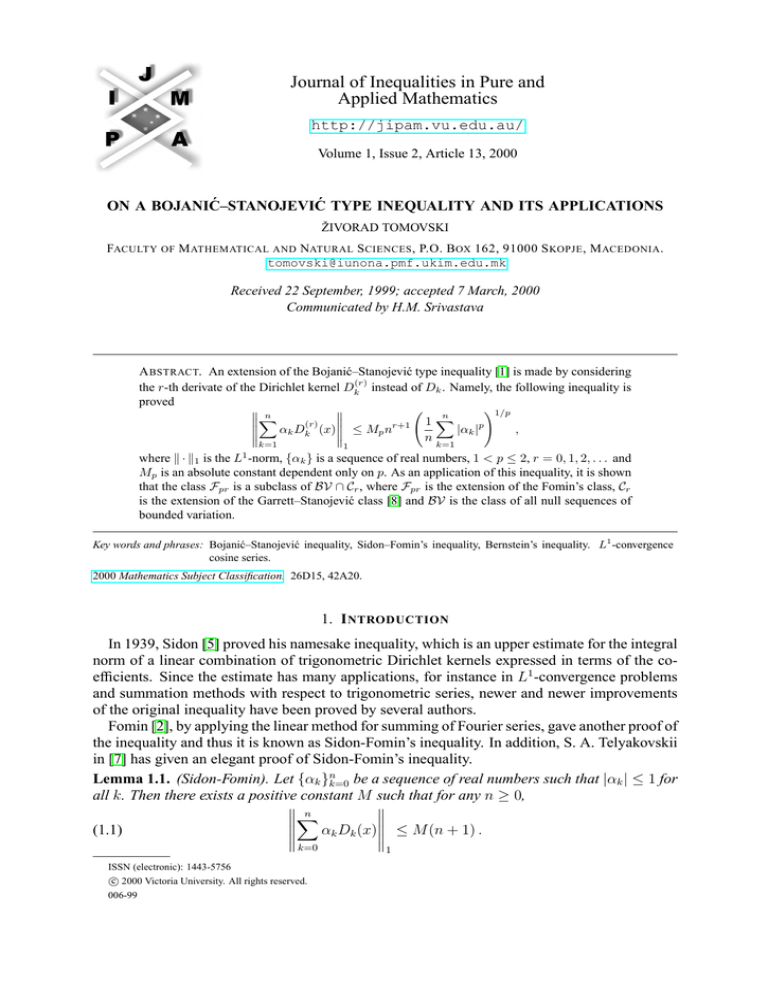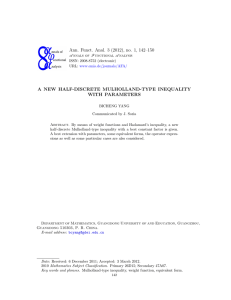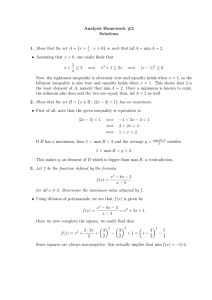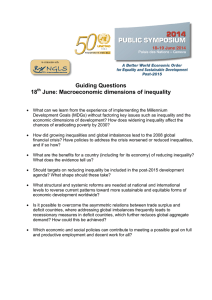
Journal of Inequalities in Pure and
Applied Mathematics
http://jipam.vu.edu.au/
Volume 1, Issue 2, Article 13, 2000
ON A BOJANIĆ–STANOJEVIĆ TYPE INEQUALITY AND ITS APPLICATIONS
ŽIVORAD TOMOVSKI
FACULTY OF M ATHEMATICAL AND NATURAL S CIENCES , P.O. B OX 162, 91000 S KOPJE , M ACEDONIA .
tomovski@iunona.pmf.ukim.edu.mk
Received 22 September, 1999; accepted 7 March, 2000
Communicated by H.M. Srivastava
A BSTRACT. An extension of the Bojanić–Stanojević type inequality [1] is made by considering
(r)
the r-th derivate of the Dirichlet kernel Dk instead of Dk . Namely, the following inequality is
proved
n
!1/p
n
X
1X
(r)
p
r+1
|αk |
,
αk Dk (x) ≤ Mp n
n
k=1
k=1
1
where k · k1 is the L1 -norm, {αk } is a sequence of real numbers, 1 < p ≤ 2, r = 0, 1, 2, . . . and
Mp is an absolute constant dependent only on p. As an application of this inequality, it is shown
that the class Fpr is a subclass of BV ∩ Cr , where Fpr is the extension of the Fomin’s class, Cr
is the extension of the Garrett–Stanojević class [8] and BV is the class of all null sequences of
bounded variation.
Key words and phrases: Bojanić–Stanojević inequality, Sidon–Fomin’s inequality, Bernstein’s inequality. L1 -convergence
cosine series.
2000 Mathematics Subject Classification. 26D15, 42A20.
1. I NTRODUCTION
In 1939, Sidon [5] proved his namesake inequality, which is an upper estimate for the integral
norm of a linear combination of trigonometric Dirichlet kernels expressed in terms of the coefficients. Since the estimate has many applications, for instance in L1 -convergence problems
and summation methods with respect to trigonometric series, newer and newer improvements
of the original inequality have been proved by several authors.
Fomin [2], by applying the linear method for summing of Fourier series, gave another proof of
the inequality and thus it is known as Sidon-Fomin’s inequality. In addition, S. A. Telyakovskii
in [7] has given an elegant proof of Sidon-Fomin’s inequality.
Lemma 1.1. (Sidon-Fomin). Let {αk }nk=0 be a sequence of real numbers such that |αk | ≤ 1 for
all k. Then there exists a positive constant M such that for any n ≥ 0,
n
X
(1.1)
αk Dk (x) ≤ M (n + 1) .
k=0
ISSN (electronic): 1443-5756
c 2000 Victoria University. All rights reserved.
006-99
1
2
Ž IVORAD T OMOVSKI
In [9] we extended this result and we gave two different proofs of the following lemma.
Lemma 1.2. [9]. Let {αj }kj=0 be a sequence of real numbers such that |αk | ≤ 1 for all k. Then
there exists a positive constant M , such that for any n ≥ 0,
n
X
(r)
(1.2)
αk Dk (x) ≤ M (n + 1)r+1 .
k=0
1
However, Bojanić and Stanojević [1] proved the following more general inequality of (1.1).
Lemma 1.3. [1]. Let {αi }ni=0 be a sequence of real numbers. Then for any 1 < p ≤ 2 and
n≥0
!1/p
n
n
X
1 X
|αk |p
,
(1.3)
αk Dk (x) ≤ Mp (n + 1)
n+1
k=0
k=0
1
where the constant Mp depends only on p.
We note that this estimate is essentially contained (case p = 2) in Fomin [2]. Sidon-Fomin’s
inequality is a special case of the Bojanić-Stanojević inequality, i.e., it can easily be deduced
from Lemma 1.3.
It is easy to see that the Bojanić-Stanojević inequality is not valid for p = 1. Indeed, if
αn = 1 and αk = 0 (k 6= n, k ∈ N) then the left side is of order log n/n while the right side is
of order 1/n as n → ∞.
In order to prove our new results we need the following lemma.
Lemma 1.4. [10]. If Tn (x) is a trigonometrical polynomial of order n, then
kTn(r) k ≤ nr kTn k .
This is S. Bernstein’s inequality in the L1 (0, π)-metric (see [10, Vol. 2, p.11]).
2. M AIN R ESULT
Now we will prove a counterpart of inequality (1.3) in the case where the r-th derivate of the
(r)
Dirichlet’s kernel Dk is used instead of D(x).
Theorem 2.1. Let {αk }nk=1 be a sequence of real numbers. Then for any 1 < p ≤ 2 and
r = 0, 1, 2, . . . , n ∈ N the following inequality holds:
n
!1/p
n
X
X
1
(r)
(2.1)
αk Dk (x) ≤ Mp nr+1
|αk |p
,
n
k=1
k=1
1
where the constant Mp depends only on p.
Proof. Applying first the Bernstein inequality and then the Bojanić-Stanojević inequality, we
have
!1/p
n
n
n
X
X
X
1
(r)
(r)
αk Dk (x) ≤ nr αk Dk (x) ≤ Mp nr+1
|αk |p
.
n
k=1
k=1
k=1
It is easy to see that the inequality (1.2) is a special case of the inequality (2.1), i.e. it can easily
be deduced from Theorem 2.1.
J. Ineq. Pure and Appl. Math., 1(2) Art. 13, 2000
http://jipam.vu.edu.au/
O N A B OJANI Ć –S TANOJEVI Ć T YPE I NEQUALITY AND ITS A PPLICATIONS
3
3. A PPLICATION
The problem of L1 -convergence via Fourier coefficients consists of finding the properties
of Fourier coefficients such that the necessary and sufficient condition for kSn − f k = o(1),
n → ∞ is given in the form an lg n = o(1), n → ∞. Here Sn denotes the partial sums of the
cosine series
∞
a0 X
+
an cos nx .
2
n=1
The Sidon-Telyakovskii class S [7] is a classical example for which the condition an lg n =
o(1), n → ∞ is equivalent to kSn − f k = o(1), n → ∞. Later Fomin [3] extended the SidonTelyakovskii class by defining a class Fp , p > 1 of Fourier coefficients as follows: a sequence
{ak } belongs to Fp , p > 1 if ak → 0 as k → ∞ and
!1/p
∞
∞
X
X
1
(3.1)
|∆ai |p
< ∞.
k i=k
k=1
We note that Fomin [3] has given an equivalent form of the condition (3.1). Namely, he proved
P
(p)
s
that {an } ∈ Fp , p > 1 iff ∞
s=1 2 ∆s < ∞, where
(
)1/p
2s
X
1
∆(p)
|∆ak |p
.
s =
2s−1
s−1
k=2
+1
P
Let BV denote the class of null sequence {an } of bounded variation, i.e. ∞
n=1 |∆an | < ∞.
The class C was defined by Garrett and Stanojević [4] as follows: a null sequence of real
numbers satisfy the condition C if for every ε > 0 there exists δ(ε) > 0 independent of n, such
that
Zδ X
∞
∆ak Dk (x) dx < ε , for every n .
k=n
0
On the other hand, Stanojević [6] proved the following inclusion between the classes Fp , C and
BV.
Lemma 3.1. [6]. For all 1 < p ≤ 2 the following inclusion holds: Fp ⊂ BV ∩ C.
In [8] we defined an extension Cr , r = 0, 1, 2, . . . , of the Garrett-Stanojević class. Namely,
a null sequence {ak } belongs to the class Cr , r = 0, 1, 2, . . . if for every ε > 0 there is a δ > 0
such that
Zδ X
∞
(r)
∆ak Dk (x) < ε , for all n .
0
k=n
When r = 0, we denote Cr = C.
Denote by Im the dyadic interval [2m−1 , 2m ), for m ≥ 1. A null sequence {an } belongs to
the class Fpr , p > 1, r = 0, 1, 2, . . . if
!1/p
∞
X
X
1 1
2m(1/q+r)
|∆ak |p
< ∞, where
+ = 1.
p
q
m=1
k∈I
m
It is obvious that Fpr ⊂ Fp . For r = 0, we obtain the Fomin’s class Fp .
Theorem 3.2. For all 1 < p ≤ 2 and r = 0, 1, 2, . . . the following inclusion holds Fpr ⊂
BV ∩ Cr .
J. Ineq. Pure and Appl. Math., 1(2) Art. 13, 2000
http://jipam.vu.edu.au/
4
Ž IVORAD T OMOVSKI
Proof. By Lemma 3.1, it is clear that Fpr ⊂ BV . It suffices to show that
∞
X
(r)
∆ak Dk (x) = o(1) , n → ∞ .
k=n
Since
∞
X
!1/p
2m(1/q+r)
m=1
X
|∆ak |p
=2
∞
X
)1/p
(
X
2(m−1)[(r+1)p−1]
m=1
k∈Im
we have
∞
X
|∆ak |p
,
k∈Im
k (r+1)p−1 |∆ak |p < ∞ .
k=1
Applying the Theorem 2.1, we obtain
!1/p
∞
∞
X
X
(r)
∆ak Dk (x) ≤ Mp
k (r+1)p−1 |∆ak |p
= o(1),
k=n
n → ∞.
k=n
R EFERENCES
[1] R. BOJANIĆ AND Č.V. STANOJEVIĆ, A class of L1 -convergence, Trans. Amer. Math. Soc., 269
(1982), 677–683.
[2] G.A. FOMIN, On linear method for summing Fourier series, Mat. Sb (Russian), 66 (107), (1964),
144–152.
[3] G.A. FOMIN, A class of trigonometric series, Math. Zametki (Russian), 23 (1978), 117–124.
[4] J.W. GARRETT AND Č.V. STANOJEVIĆ, Necessary and sufficient conditions for L1 convergence
of trigonometric series, Proc. Amer. Math. Soc., 60 (1976), 68–72.
[5] S. SIDON, Hinreichende Bedingungen fur den Fouirier charakter einer Trigonometrischen Reihe,
J. London, Math. Soc., 14 (1939), 158.
[6] Č.V. STANOJEVIĆ, Classes of L1 convergence of Fourier series and Fourier Stiltjes series, Proc.
Amer. Math. Soc., 82 (1981), 209–215.
[7] S.A. TELYAKOVSKII, On a sufficient condition of Sidon for the integrability of trigonometric
series, Math. Zametki (Russian), (1973), 742–748.
[8] Ž. TOMOVSKI, An extension of the Garrett- Stanojević class, Approx. Theory Appl., 16(1) (2000),
46–51. [ONLINE] A corrected version is available in the RGMIA Research Report Collection, 3(4),
Article 3, 2000. URL: http://rgmia.vu.edu.au/v3n4.html
[9] Ž. TOMOVSKI, An extension of the Sidon-Fomin inequality and applications, Math. Inequal.
Appl., (to appear).
[10] A. ZYGMUND, Trigonometric Series, Cambridge Univ. Press, 1959.
J. Ineq. Pure and Appl. Math., 1(2) Art. 13, 2000
http://jipam.vu.edu.au/









